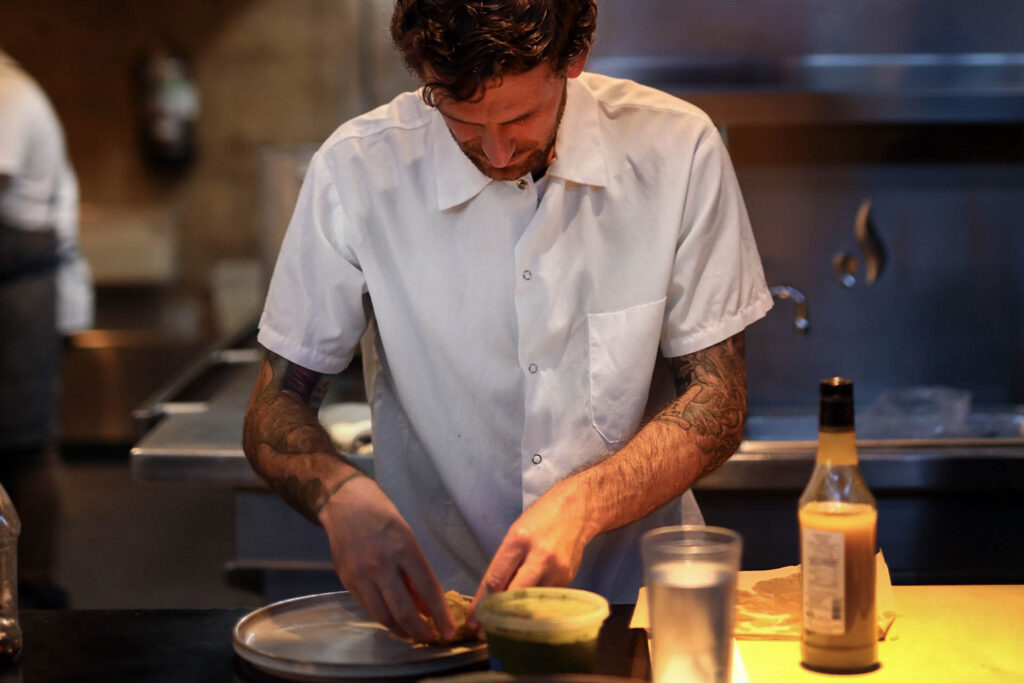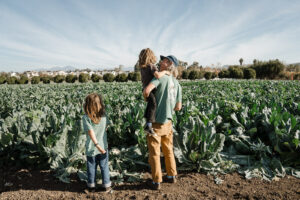As San Diego’s only 2022 James Beard Award nominee, Chef Anthony Wells of Juniper & Ivy has made his name through presenting intimidating ingredients in nostalgic, comforting preparations while pushing the boundaries of the familiar. Having spent the past eight years developing relationships with local wild-capture fisheries, environmentally responsible marine aquaculture, and small-acreage growers of heirloom, ethnic, and specialty crops, Chef Anthony is a longtime champion of local and seasonal cooking whose inventive technique and artful plating elevates farm-focused cuisine.
Read our conversation with Chef Anthony below, and click here to get tickets to his upcoming Community Table dinner.
The Ecology Center: What first sparked your imagination regarding local seasonal ingredients?
Chef Anthony: When I was given control of the menu creation at Juniper & Ivy, I knew that if we wanted to continue to evolve, we would have to have lots of support. Every time I met a farmer here or a fisherman there, I developed a friendship with them—I was very consistent about staying in communication with them and making sure I could get their product in the restaurant. No matter how busy I was, I never budged on that. I fell in love with not only their product (which was always the best I had ever seen), but also with the weekly conversations I had with them, educating me on their area of expertise and the importance of family-run small businesses.
The Ecology Center: What drives your passion for regenerative cuisine?
Chef Anthony: Education. Sustainability. Creativity. It just makes sense. It is what is abundant at that time of year, it will save your restaurant money in the long run, you’re supporting your local community, and most importantly, the food tastes better.
The Ecology Center: How has a regenerative ethos developed your cooking?
Chef Anthony: This ethos has definitely shaped my career and my lifestyle. I’m always trying to adapt certain aspects that I learn on the farms back at my home in West Virginia, and if I can learn to incorporate something new into my life, I usually then try to bring it to the restaurant to share with our cooks.
The Ecology Center: What do you see as one of the culinary industry’s biggest challenges to caring for the earth?
Chef Anthony: Eliminating single-use plastics. Unfortunately, restaurants run on a very strict budget. At the end of the year, chefs and general managers must always be strategic about what we are purchasing. Plastics tend to be the more affordable options; if you are a struggling restaurant, it makes sense to avoid using an option such as biodegradable bamboo straws and boxes. All of us need to put our minds together to fix this problem sooner than later.
Also, most cities don’t have composting programs for restaurants, including San Diego. With the amount of food waste that is produced each year, we also need to figure out how we can get that food to shelters, not landfills. With hunger on the rise and the rising costs of animal feed, I wish there was a better solution to what is currently being done. I will be part of the solution moving forward.
The Ecology Center: How can the culinary industry do a better job of caring for people?
Chef Anthony: Staying involved in the community. Donate a certain amount of your proceeds if you have a good month, or if you need all that revenue to keep the restaurant afloat, just volunteer. I’m sure the local food rescue is always looking for an extra set of hands…or, for that matter, the local community farm.
The Ecology Center: If you could change one aspect of our current food system or culture through your work, what would it be?
Chef Anthony: Accessibility. I imagine it gets discussed a lot and I’m probably too young to have an answer on how to get it done, but why can’t we get fresh fruits and vegetables to more people at more affordable prices? I recall when I was younger, the price for snack foods and candy was so much less expensive than carrots or broccoli or bell peppers. It always pissed me off, especially as I got older and understood the reason behind a lot of the eating habits that were developed in my family. Being from West Virginia, I understand that most families eat the way they do out of necessity more often than desire—they’re trying to stretch their dollar as far as they can. I don’t have a great answer to solve this, but I do think about it often and would love to be in a position in the future to help navigate such a simple yet gigantic task .
The Ecology Center: When you imagine a food culture that cares for the earth, cares for people, and shares abundance with those in need, what does it look like to you?
Chef Anthony: I was really blown away by my tour of the Ecology Center. The idea of planting, picking, cooking, preserving, teaching, and paying it all forward to the next generation gives me goosebumps. I’ve been thinking a lot about it and would totally love to bring that idea to San Diego County. Putting more back in than you take out is what we all need to do more. I’m so excited to be a part of what is happening there.








